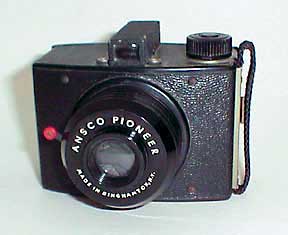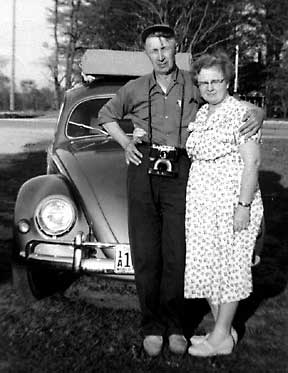

The top photo
is an example of the first camera I ever owned--an Ansco Pioneer 620.
The Pioneer was made from 1947 to 1953 in Ansco's Binghampton, New York
plant. It was manufactured in two film sizes, 620 and the larger 616.
The cameras are identical except the 616 has a larger body. I don't
think too many 616s were made as that format was already on its way
out before the war ended. The Pioneer has a single speed
shutter and fixed focus lens. The lens wasn't optically flat so the
film plane was curved to try to match the lens.
I liked the Pioneer, which my father picked up used
at an auction, because it looked like a "real camera" not a box.
In 1956, at age 11, I accompanied my parents on a
trip from Idaho to the East Coast. Dad borrowed a Leica to record the
trip but never figured out how to load it properly (he was more comfortable
with a Speed Graphic). He didn't get a usable picture. The only photographic
record of our journey came from my Ansco Pioneer. The photo shown here
was taken by me of my parents during a stop in Traverse City, Michigan,
(the Leica around his neck looks cool even if he couldn't figure it
out). The quality of the photo is exceptional for the camera. They usually
weren't this clear. The following year our sixth grade class took an
airplane ride in an old Douglas DC 3 that was probably built during
World War II. I learned that it was impossible to hold the Pioneer steady
enough in the vibrating old aircraft to get a picture that wasn't fuzzy.
I was in junior high when Mother purchased our first
real 35mm camera--an Ansco (Agfa) Super Memar. When I was in high school
I got my first SLR--an Exa I--for $39.95, brand new, with case. Just
before starting college the Exa was traded off for a used Canon IV SB
rangefinder camera. I think the price was less than $100 at a local
pawn shop.
About 1968 and Canon was replaced by a used Petri Flex V
(no meter, but an instant return mirror. Withing a few months that was
replaced by an Asahi Pentax H1a with 35mm, 50m and 200mm lenses. Next
was my first SLR with through-the-lens metering, a Mamiya Sekor 1000
TL
Finally, 1n 1969 I stepped up to a Nikkorman FTN and later
added a Nikon F with FTN finder (Really more than our budget could stand).
I stuck with Nikon for the next decade.